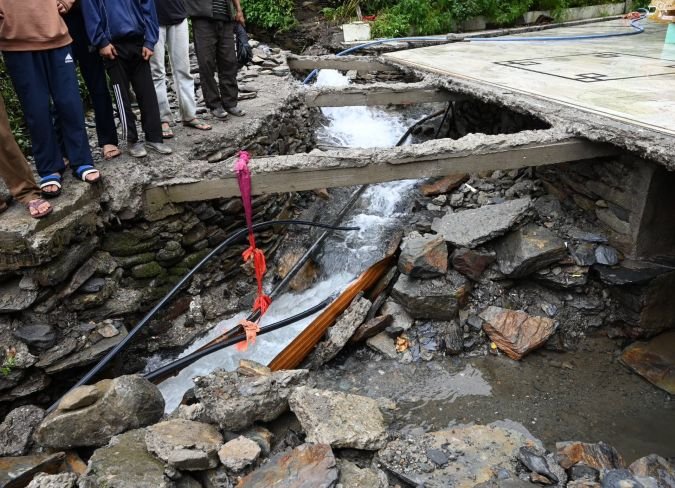Himachal Pradesh is facing one of the worst phases of devastation in recent memory. Raging floods, recurring landslides, and collapsing roads have brought the state to a standstill, leaving thousands of residents and pilgrims stranded, fearful, and helpless. Entire stretches of highways have been washed away, villages have been cut off, and sacred pilgrimage routes like the Manimahesh Yatra have turned into corridors of tragedy. Yet, amidst this collapse, what echoes most painfully in the minds of the people is not just the roar of falling mountains or the gushing torrents of rivers, but the deafening silence of the government led by Chief Minister Sukhvinder Singh Sukhu.
The Congress government, which came to power promising safety, stability, and swift action in times of need, now finds itself accused of indifference and inaction. Citizens on the ground are living the horror of nature’s fury without food, shelter, or security, while the state machinery seems paralyzed. In districts like Chamba, Kangra, Kullu, and Mandi, people recount nights spent under the open sky, fearing another landslide might swallow their homes. Mothers weep over children who cannot access medical aid, farmers watch their fields drown under layers of mud, and shopkeepers stare at roads ripped apart, cutting off their only sources of livelihood.
Opposition leaders have seized on the situation, and rightly so. The BJP has not minced words, accusing the Sukhu government of abandoning its people at the hour of their greatest need. Senior leaders point out that while natural disasters cannot be prevented, disaster management can certainly save lives—but here, there has been little evidence of preparation or rapid response. Relief camps are either inadequate or missing, and rescue operations often arrive too late. The ruling dispensation, critics argue, seems more preoccupied with political calculations than with the suffering of its citizens.
The Himachal Pradesh Congress government’s failures are glaring. The Chief Minister’s assurances are drowned out by images of villagers digging through rubble with their bare hands in search of loved ones, because no help reached them in time. Roads are destroyed, bridges have collapsed, yet the government has failed to present even a basic plan to restore connectivity. Questions abound: why was the state not prepared despite repeated warnings of heavy rainfall and landslide risk? Why are resources so poorly allocated that residents say they feel abandoned? Why is the government silent when the people cry for answers?
In a state where tourism and pilgrimage form the backbone of the economy, the destruction of routes like the Chamba-Bharmour road has not only caused immediate deaths but also crippled livelihoods. Traders, hoteliers, and taxi drivers who depend on seasonal pilgrim traffic now see their earnings vanish overnight. The Sukhu government has offered words of sympathy, but little in terms of concrete relief packages, fueling growing anger among those who are left to fend for themselves.
The opposition is framing the government’s apathy as a betrayal. BJP leaders allege that the Congress regime’s mismanagement has worsened the disaster’s impact, calling for accountability from the Chief Minister himself. The anger on the streets mirrors this sentiment. Villagers openly question whether their lives matter to those in power, or whether the promises made during elections were nothing more than empty slogans.
What is unfolding in Himachal Pradesh is not just a natural calamity but a political reckoning. Disasters reveal the true strength of governance, and today, the Congress government under Sukhu stands exposed as unprepared and unresponsive. Every washed-out road, every home buried under debris, every life lost due to delayed action is a reminder of promises unkept. The tears of Himachal’s people are flowing as endlessly as its rivers, but their cries for justice remain unanswered.
The state’s citizens do not need rhetoric, they need leadership. They do not need sympathy, they need action. They do not need a silent government, they need one that stands shoulder-to-shoulder with them in their darkest hour. And until the Sukhu government takes responsibility and delivers results, the opposition’s voice will only grow louder, echoing the pain of a population abandoned when it needed its leaders most.




